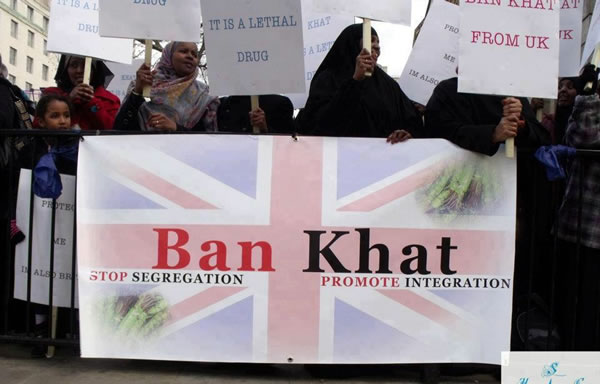
Demonstration: Somali Community in UK seeking the ban of Khat
Abukar Awale (Qaad–Diid)
The Lead Anti-khat Campaigner
Dear UK PM Honourable David Cameron
I find myself knocking your door again with one kilo of khat with me again I feel compelled to write this letter as a concerned member of the community almost exasperated at the lack of progress being made on this long standing issue. We as a community feel we have spoken with one voice by requesting in no uncertain terms that the UK government BAN qaad, or catha edulis to call it by its scientific name. We have made this request on the basis of evidence of medical and social harm and not on the basis of our whims. I say we, because an online petition requesting that qaad be made illegal managed to successfully garner over one hundred thousand votes in its favour. I remind you that in opposition, the Conservative party pledged that it would ban qaad if it came into office and now, three years into this parliament, we see no signs of this on the government’s agenda. Large sections of the Somali community voted Conservative almost against their instincts, thereby contributing to your political mandate more in expectation rather than hope that the Conservative party would help us help ourselves. Enthusiastic expectation that this would come to pass has now been transformed into dwindling hope that this will be seen through.
The intransigence on this issue is perplexing, particularly given the backdrop of the Conservative message being put out about taking individual responsibility in these tough economic times, is that we are essentially requesting in vain that the government help us overcome unnecessary barriers to our integration into wider society. Partly due to the fact that the last stable government Somalia ever had was a ruthless dictatorship, the concept of the Big Society did resonate with us in that smaller government would allow us to take control of our affairs and thereby allow us to regain a modicum of self esteem and dignity by contributing positively to our local communities and by extension, society at large. Somali society has unfortunately suffered over the past few decades from a brain drain and high levels of illiteracy in certain age groups as a direct result of civil war. Seeing these very same people come together in modern day Britain to try and achieve the banning of qaad in a democratic manner is in a way an achievement in itself. A lack of an end result will lead many to conclude that the many well-documented qaad related deaths across Britain were in some way less important than the meow-meow related deaths that were given the oxygen of publicity in the national media in 2010. Does this therefore mean that if khat were as widely used as meow-meow was that it would be banned? Its difficult to conclude otherwise.
The voluminous social and scientific, empirical evidence of qaad’s harm has for some reason been offset by the claim that it is part of Somali culture. It is important to distinguish between cultural norms and individual vices and habits. The growing number of single parent families in our community has given rise to an increasing stigma being attached to the consumption of qaad as its very mention conjures images of being the primary cause of family breakdown. The word qaad itself linguistically means to ‘take’ in that once one consumes it, that individual is therefore ‘taken’ under it’s influence. The reference to the mosque in Cardiff that deems Khat to be permissible from an Islamic perspective is laughable and I feel confident enough to claim that you would be hard pressed to find any segment of Somali society (apart from those whose financial interests it serves) prepared speak in its favour.
The ACMD states that due to khat’s bitter taste means that it would be unattractive for potential users. Well, we often hear that many alcoholic drinks are an acquired taste but on a more serious note, I put it to you that there has been an alarming trend of a growing number of UK born Somalis consuming Khat more regularly. Of real concern is the report’s alarmingly naive understanding of how khat is sold and distributed. Does the ACMD honestly believe that khat is sold, distributed and consumed in line with statutory health and safety legislation?
It is confusing to learn that both cathine and cathinone, while individually banned in the UK, are somehow rendered legal in leaf form when the combination of the two is found in qaad. It is also difficult to comprehend how the UK is out of step with much of the EU (including most recently Holland, I might add), the USA and Canada with regard to the legal status of qaad. Why is this the case? Is Britain out of touch? Or is the government’s position on this commensurate with the perception that qaad only affects the Somali community and therefore pushed to the very bottom of the government’s to do list?
We appreciate that the coalition is facing immense challenges in terms of balancing the nations finances in the context of seemingly unrelenting economic crises in the Eurozone and the wider global economy, not to mention high levels of youth unemployment to name but a few. But we would like to play our part, however small, in at least contributing on a community level by assimilating, integrating and setting a positive example for our children. We call upon the government to remove the needless barrier of qaad and help us unlock this undoubted potential as we are desperate to portray a positive image of our community and thereby at least begin to repay the hospitality granted to us as refugees from our war-torn homeland.
Yours sincerely
Abukar Awale (Qaad –Diid)
The Lead Anti-khat Campaigner